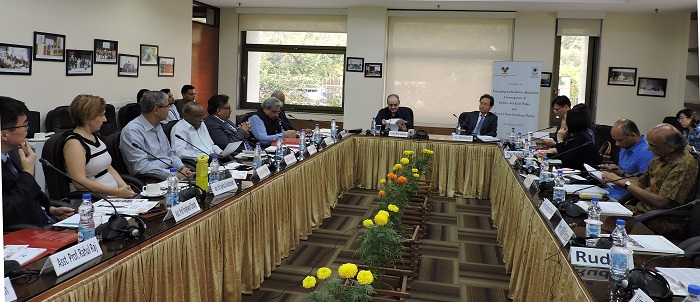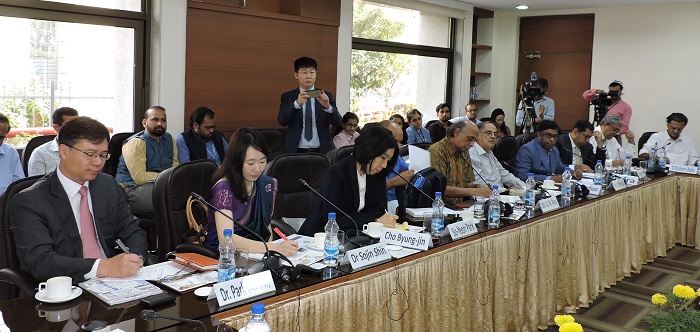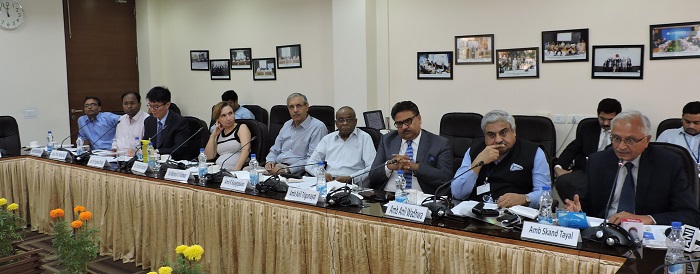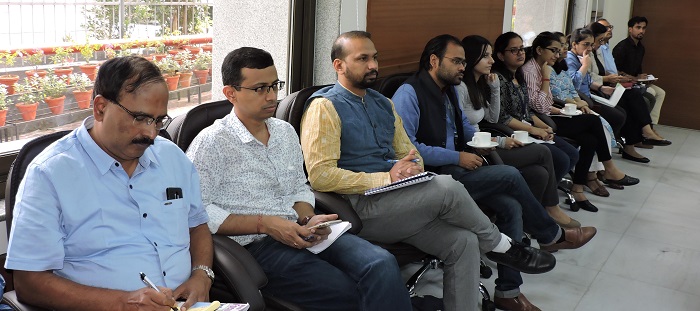

The VIF, in collaboration with Embassy of the Republic of Korea in New Delhi, organised a seminar on “Emerging India-Korea Relations: Convergence of India's Act East Policy and Korea's New Southern Policy". The welcome remarks were delivered by Lt Gen Ravi Sawhney while the opening address was delivered by H.E. Shin Bongkil, Ambassador of the Republic of Korea to India. Presentations from the South Korean side were made by Dr. Park Ihn-hwi, Professor, Division of International Studies, Ewha Womans University, and Dr Sojin Shin, Institute of South Asian Studies, National University of Singapore. The presentations from the Indian side were made by Amb. Skand Tayal, former Ambassador of India to South Korea and Amb. Anil Wadhwa, formerly Secretary (East), Ministry of External Affairs. Some of the salient points raised during the deliberations are as described in succeeding paragraphs.

With a strong reflection of diplomatic relations in domestic politics, the current the Moon Jae-in administration has sought to give greater priority to foreign policy, unlike the previous South Korean administrations. However, differences in interests between major powers on denuclearisation of North Korea (and the eventual peace process) on Korean Peninsula have created a fundamental gap for South Korea. Under the New Southern Policy, South Korea seeks to expand engagement beyond US, China, Russia and Japan to India and ASEAN whose role in regional affairs in recent time have grown tremendously. Also with India’s rising economy, South Korea now strives to strengthen its bilateral ties after having neglected India in its foreign policy canvas for last few decades.

With a strong peace-oriented approach to resolving the lingering tensions with North Korea, the current South Korean administration is willing to pursue trade-offs between ‘denuclearisation’ and ‘peace processes’. Over the years, North Korea has maintained an ambiguous strategic position by engaging intermittently with the international community while continuing its missile and nuclear weapons programs due to its fears of regime survival. As a moderator between the US and North Korea, South Korea aims to help North Korea re-join the international community as the dire isolation and economic difficulties post- Cold war have become a critical security threat to North Korea. With India having minimum sensitivities to North Korea unlike other major powers, suggestions were also made on India becoming a major interlocutor for the peace process on the Korean Peninsula.

Unlike other regional associations, intra-regional economic engagement in Northeast Asia has not institutionalised into larger political and security structures. Though multilateral forums like East Asian Summit and ASEAN Regional Forum do exist, but their impact is limited as they are more of voluntary based organisations. Ironically, while China, Japan and South Korea contribute more than 55 per cent of Global Gross Domestic Product (GDP) and the intra-China, Japan, Korea trade accounts for 30 per cent of their total trade volume, they are very sensitive to each other in terms of security due to lingering historical legacies, territorial disputes and their alliance structures in the region. Further, the rise of China with its manifold implications has strained the existing security apparatus in the region. With the growing conflict between the US and China, the earlier norm of compartmentalising ‘security’ and ‘economic’ domains has now become entangled, with the aftermath of the installation of THAAD ballistic missile defence system in South Korea being a case in point.

Though the Moon Jae-in administration has refrained from making any position on Indo-Pacific system, the South Korean side indicated their growing interest in the concept as a larger geo-strategic configuration. They also mentioned their interest in joining Indian Ocean Rim Association (IORA).
A whole gamut of issues were elaborated and discussed at length from the July 2018 summit between Indian Prime Minister Narendra Modi and President Moon Jae-in, to the convergence of interests and capacities between the two countries. The Indian side highlighted the problems of investment restrictions faced by Indian companies in South Korea, better implementation and upgrade of existing Comprehensive Economic Partnership Agreement (CEPA), and potentialities of cooperation in the defense sector, shipbuilding industry, electronics, heath care, power and infrastructure in India. The Korean side highlighted the issue of India’s decision to not accept Official Development Assistance (ODA) from other than G-8 countries (this was clarified as Indian Government’s easing rules for accepting ODA in late 2015). Other hurdles in boosting relationship, as mentioned by South Korean side, included the structural and institutional constraints such as lack of political will, bureaucratic red tape, lack of centre-state cooperation, socio-political hazards, lack of cultural understanding of India, etc.
Links:
[1] https://www.vifindia.org/event/report/2018/october/24/seminar-on-emerging-korea-india-relations
[2] http://www.facebook.com/sharer.php?title=Seminar on “Emerging India-Korea Relations: Convergence of India's Act East Policy and Korea's New Southern Policy" in collaboration with Embassy of Republic of Korea&desc=&images=https://www.vifindia.org/sites/default/files/DSCN5228.JPG&u=https://www.vifindia.org/event/report/2018/october/24/seminar-on-emerging-korea-india-relations
[3] http://twitter.com/share?text=Seminar on “Emerging India-Korea Relations: Convergence of India's Act East Policy and Korea's New Southern Policy
[4] whatsapp://send?text=https://www.vifindia.org/event/report/2018/october/24/seminar-on-emerging-korea-india-relations